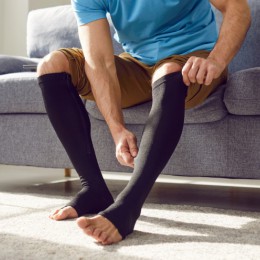
Lymphedema and Lipedema - What is going on in your body?
What is the Lymph System?
The lymph system is part of your immune system. It has three main functions:
• To help remove waste from your tissues
• To produce white blood cells to fight infection and illness
• To transport excess fluids from your tissues back into the bloodstream
Two forms of lymphedema
There are two forms of lymphedema: primary and secondary. Primary is caused by a genetic defect in the lymphatic system, while secondary occurs after damage to the lymph nodes or vessels.
The latter is more common, and can result from cancer treatment, injury, infection, surgery, radiation therapy, scar tissue formation, obesity and other factors.
.jpg)
Making a plan to eat healthy
Eating better is even more important for those who suffer from Lymphedema and Lipedema. Maintaining a healthy weight and keeping our weight in check greatly benefits those who need to prevent obesity from developing.
According to doctors, eating better is even more important for those who suffer from Lymphedema and Lipedema.
Maintaining a healthy weight and keeping our weight in check greatly benefits those who need to prevent obesity from developing.
The foods we eat each day determine our overall health and ultimately how we feel and perform. Eating wholesome, nutritious food keeps us healthy and less susceptible to diseases such as cardiovascular disease, diabetes, high blood pressure, cancer, osteoporosis, kidney disease and other serious conditions.
When we eat healthily, we also feel better about ourselves. We look good and dress well. Our immune system is stronger when we eat right which means that we are less likely to get sick or have the flu.
Eating a variety of foods helps us stay physically fit while providing the nutrients our body needs to maintain good health. For example: whole grains provide energy through carbohydrates; lean proteins give us necessary amino acids; fruits and vegetables offer vitamins A-G; dairy products provide calcium for strong bones; fish contain omega fatty acids; nuts provide protein; seeds provide iron; legumes supply fiber; legumes provide iron and vitamin B-12; legumes promote digestive health with dietary fibers.
Studies have shown that around 50% of patients with lipedema also struggle with being overweight. This can enhance symptoms and lead to increased water retention and mental stress. While there are many fad diets out there, they typically aren’t long-lasting. Maintaining a balanced diet will achieve lasting success. The right diet can play a very important role in supporting a successful therapy.
Helpful tips:
-
Eat fruits and veggies (follow the traffic light principle - red, yellow and green foods)
-
Choose healthy fats like nut butters and avocado
-
Consume meat and dairy in moderation
-
Follow a low-salt diet
-
Take breaks in between meals to allow full absorption of foods
-
Drink lots of water
-
Get moving outside

There are many benefits to eating healthy, especially for Lymphedema & Lipedema.
There are plenty of benefits to eating healthy, especially for those dealing with Lymphedema & Lipedema. But it isn’t just about managing weight and fluid retention. Eating nutritious foods also helps with managing pain that comes with both lymphedema and lipedema.
We all want to be healthy, and that often means eating a good diet. There are plenty of thoughts and opinions on what the “best” nutrition is for lymphedema and lipedema, but one thing that we can agree on is that some strategies are better than others. Hopefully this list will help you with your next trip to the grocery store—or give you some ideas on how to eat healthier in your own unique situation.





0 comments